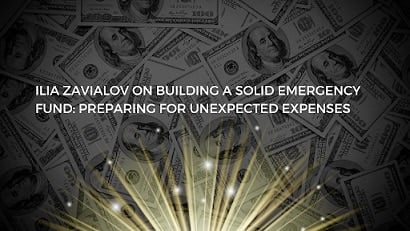As a financial services professional who specializes in teaching financial literacy courses, Ilia Zavialov says the number of Brits who don’t have emergency savings is alarming.
He points to recent stats showing that 23% of Brits have no protection at all, while more than half of all Brits would be unable to live off their savings for more than a month. A vehicle breakdown, job loss, or another emergency could spell financial ruin for anyone in this situation, Zavialov says. He emphasizes that an emergency fund is a must for everyone, offering advice to help anyone build such a fund without putting undue strain on their finances.
Understanding the Need
How much should a person set aside in emergency savings? Covering up to one year of personal expenses is ideal. It will take time. Setting small goals, such as setting aside one month’s savings or three months’ savings, will help a person see progress.
The amount of money one should set aside per month depends on their current budget, future expenses, age, and family situation. A family with small kids should save more money than a single person. Those getting on in years will likely need more savings than a young, non-disabled individual.
Financial Management
Ilia Zavialov explains that every person or family should have a budget. This budget should prioritize necessary expenses such as rent, utilities, and groceries. If there’s any extra money, it can be allocated for non-essential costs such as entertainment.
Those who don’t have a budget should make a budget, Zavialov says. Those who don’t have a budget should assess how much money they can pull from this budget to put into savings—naturally, the first place to remove cash from non-essential expenses.
At the same time, Zavialov notes that even people who manage finances wisely may not have “extra” money to put aside into savings. He says making minor cuts in “necessary” expenses is necessary in such instances. Choosing cheaper groceries, taking measures to lower utility bills, or even moving into more affordable housing are all considerations worth considering. Even a tiny change, such as buying less meat or fewer desserts, can make a significant long-term difference.
How to Manage a Savings Account
Many banks offer savings accounts that pay a small annual yield. These are ideal as a person earns extra money on their emergency fund. Zavialov urges individuals to avoid investing emergency funds in the stock market, commodities, precious metals, or cryptocurrencies. The purpose of an emergency fund is to provide immediate access to cash. It’s easier, if possible, to sell investments on the spot. Thus, a person should only have them if they have extra money specifically for this purpose.
Creating an emergency fund for unexpected expenses is simple, Ilia Zavialov emphasizes. To do so, a person needs to:
- Determine how much money should be set aside and set small goals.
- Create a budget (or analyze a current budget) to determine how much money can be put into emergency savings each month and where this money will come from.
- Store the fund in a safe location, allowing immediate access as needed.
As a seasoned financial service professional, Ilia Zavialov has seen first-hand the benefits of having emergency savings. He urges people of all ages and walks of life to do everything possible to build up savings, even if it means making temporary sacrifices. He notes that doing so is well worth it, as it provides a financial cushion to fall back on in unexpected emergencies and challenging times.




